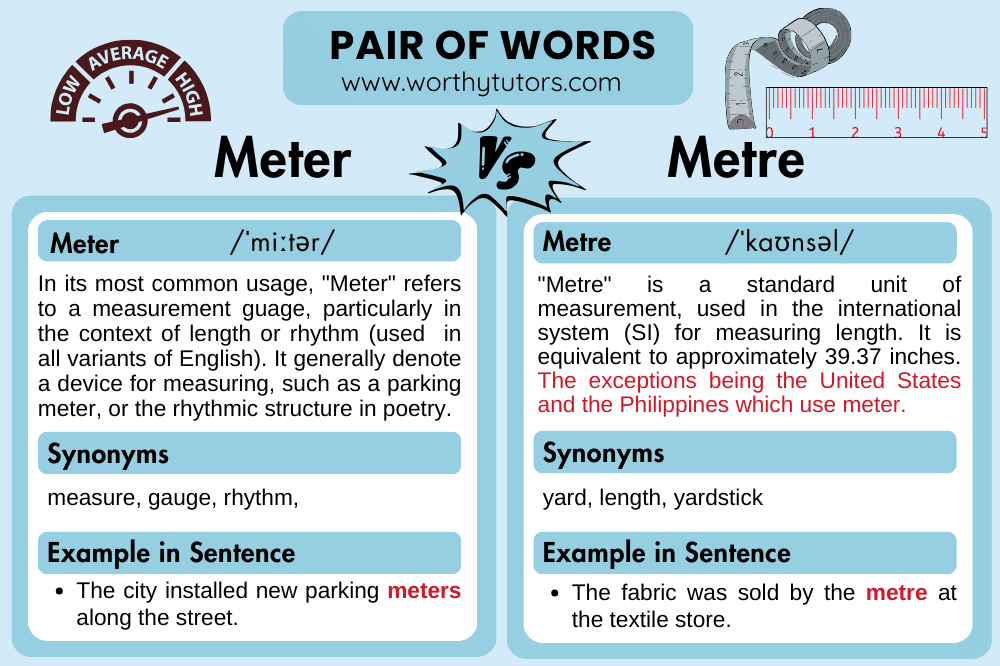
Differences and Usage | Meter vs. Metre
The terms “meter” and “metre” are often a source of confusion because of their identical pronunciation but different spellings and usage depending on the variant of English. This article will provide an in-depth look at these terms, offering clarity on their pronunciation, synonyms, meanings, usage, and examples.
Meter
Pronunciation of Meter
The word “Meter” is pronounced as /ˈmiːtər/ “MEE-ter.”
Meaning of Meter
In its most common usage, “Meter” refers to a unit of measurement, particularly in the context of length or rhythm. It can denote a device for measuring, such as a parking meter, or the rhythmic structure in poetry.
Synonyms of Meter
Synonyms for “Meter” include measure, gauge, rhythm, and beat.
Etymology and Explanation of Meter
The term “Meter” originates from the Greek word “metron,” meaning “measure.” In English, it evolved to encompass various measurements and rhythmic patterns.
In American English, “meter” refers to any measuring device, such as a parking meter, gas meter, or electricity meter. It also denotes the structured rhythm of a poem or piece of music.
Example of Meter in Sentences
- The taxi fare was determined by the meter.
- The poem followed a strict iambic penta-meter.
- The city installed new parking meters along the street.
- The taxi driver turned on the meter as soon as we started the trip.
- The poet was known for his complex meter and rhyme schemes.
Metre
Pronunciation of Metre
“Metre” is pronounced as /ˈmiːtər/ “MEH-ter.”
Meaning of Metre
“Metre” is also a unit of measurement, primarily used in the international system (SI) for measuring length. It is equivalent to approximately 39.37 inches.
Synonyms of Metre
Synonyms for “Metre” include yard, measure, length, and yardstick.
Etymology and Explanation of Metre
Like “Meter,” “Metre” traces its roots back to the Greek word “metron.” It entered English through French, retaining its original meaning as a unit of measurement.
In British English, “metre” is the standard measurement of length. It is used in scientific, educational, and everyday contexts to quantify distance or length.
Example of Metre in Sentences
- The fabric was sold by the metre at the textile store.
- The runner completed the 100-metre dash in under 10 seconds.
- The blueprint specified the length of the room as 5 metres.
- He measured the fabric in metres to make sure he had enough.
- The swimming pool was 25 metres in length.
Usage of Meter and Metre
Meter is used in American English for both the measuring device and the unit of rhythm in poetry and music.
Metre is used in British English for the unit of length in the metric system.
Key Difference Between Meter and Metre
While both “Meter” and “Metre” refer to units of measurement, “Meter” is primarily used in American English, whereas “Metre” is the British English spelling. Additionally, “Meter” can also denote rhythmic patterns in poetry, while “Metre” is exclusively used for length measurement.
Summary
While “meter” and “metre” may sound identical, their usage depends on the variant of English being used. “Meter” is the preferred spelling in American English for both the measuring device and the unit of rhythm, while “metre” is used in British English to refer to the unit of length in the metric system. Understanding these differences is crucial for accurate communication and writing, especially in academic and international contexts.
Fill in the Blanks Exercise Using Words Meter and Metre
- The marathon route was marked every kilometer with a small sign indicating the distance in _____.
- The fabric was sold by the _____ at the textile store.
- The musician adjusted the _____ to match the tempo of the song.
- The city installed new parking _____ along the street.
- The construction project required precise measurements down to the nearest _____.

About Authoress
Mahnoor Jehangir is a seasoned educator and linguist, specializing in English language and literature. With a master’s degree in English and applied linguistics, Mahnoor serves as a subject lead, while also indulging her passion for writing, exploring the nuances of language and storytelling.